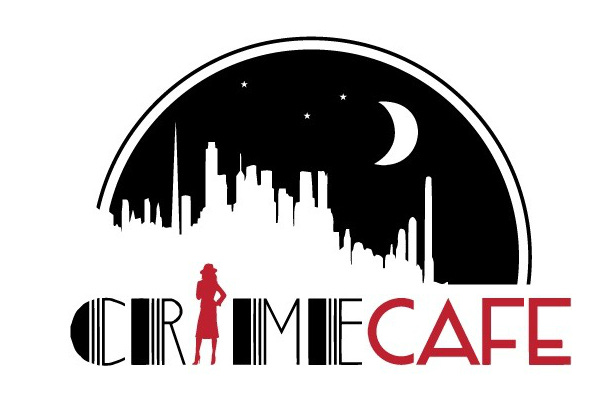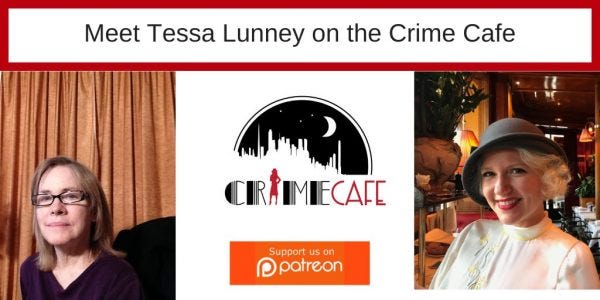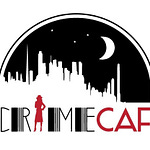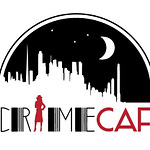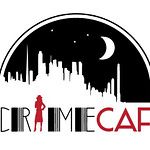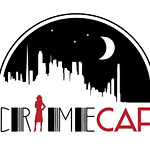Subscribe: Apple Podcasts | Google Podcasts | Spotify | Android | Stitcher | Blubrry | Email | TuneIn | RSS | More
This episode of the Crime Cafe podcast features my interview with crime writer Tessa Lunney.
Check out our discussion about her Kiki Button series set in 1920s Paris, and experiencing the joys of bohemian living, if only vicariously. :)
Before I bring on my guest, I’ll just remind you that the Crime Cafe has two eBooks for sale: the nine book box set and the short story anthology. You can find the buy inks for both on my website, debbimack.com under the Crime Cafe link. You can also get a free copy of either book if you become a Patreon supporter. You’ll get that and much more if you support the podcast on Patreon, along with our eternal gratitude for doing so.
Check us out on Patreon: https://www.patreon.com/crimecafe
Debbi (00:54): But first, let me put in a good word for Blubrry podcasting.
I’m a Blubrry affiliate, but that’s not the only reason I’m telling you this. I’ve been using Blubrry Podcasting as my hosting service for my podcast for years and it’s one of the best decisions I ever made. They give great customer service, you’re in complete control of your own podcast, you can run it from your own website, and it just takes a lot of the work out of podcasting for me. I find for that reason that it’s a company that I can get behind 100% and say, “You should try this.” Try Blubrry. It doesn’t require a long-term contract, and it’s just a great company, period. It also has free technical support by email, video, and phone, so you can get a human being there. Isn’t that nice?
If you want to podcast, try out Blubrry. No long-term contract, excellent distribution, and great technical support, too, by email, video, and on the phone. I’ve included an affiliate link on this blog.
I’ve included an affiliate link on this blog.
Download a copy of the PDF transcript of this episode here.
Or click on "View entire message".
Debbi (00:54): Hi everyone. Today it’s my pleasure to have with me an author who writes about a bohemian woman with a mission in Paris during the 1920s. Her protagonist is Kiki Button and her latest novel is Autumn Leaves. Along with her fiction, she writes poetry and reviews. I’m pleased to introduce Tessa Lunney here today. Hi, Tessa. Thanks for being with us today.
Tessa (01:22): Hi, Debbi. It’s a pleasure.
Debbi (01:23): Wonderful to have you on. Thank you for being here. And I loved your book, by the way. I still have to review it. I feel real bad about that, but it was a very enjoyable book. Tell us about Kiki Button and your series.
Tessa (01:41): Yeah, sure. So Kiki Button, the book is set in the early 1920s in Paris. So the first book was April in Paris, 1921, and the second book is Autumn Leaves, 1922. Kiki Button is an Australian expat. She was a nurse in the Great War but doesn’t want to live in Australia anymore. She wants a life of greater freedom, adventure and fun really. So she runs away back to Paris, which she had come to know during the war. In Paris, she meets up with the friends that she’d made during that time. Friends from Australia such as Maisie, who was another nurse, as well as friends from the British Army such as Bertie. When she’s in Paris, she works as a gossip columnist for a London magazine reporting on all the fabulous celebrity and aristocratic goss that was going on in Paris at the time. But secretly, she’s also a very reluctant but very capable spy.
(02:46): She had been recruited during the war by her archnemesis, the nefarious head surgeon, Dr. Fox. And Dr. Fox finds her again after the war. He’s still working for the British government and he’s going to make sure that Kiki works for him. So that’s who Kiki is. She’s a very lively vibrant person who is also quite straightforward about the problems that she carries with her from the war and from what she did and how that affects her day-to-day life. She’s enormous fun to write and sometimes I feel that she just writes herself. I can hear her speaking in my head.
Debbi (03:30): That’s wonderful.
Tessa (03:33): Especially her clothes. Yeah, it is. It’s good fun. Especially her clothes and her shoes and her parties. These are super, super great. So the series has two books in it at the moment, and the first one is when she arrives first back in Paris after deciding she wants to leave Australia. The second one is when she returns to Paris after being in Australia for a year after the death of her mother. So they’re sort of different in tone. She’s still the same vibrant woman, but the first one is just pure joy. And the second one is a little deeper, is a little deeper, a little heavier.
(04:17): I think of them as in the sort of the Paris book subgenre, if you know what I mean. So there are, there’re sort of mystery, spy thriller, I call them a sexy spy thriller set in the 1920s. But there’s also a lot of romance and there’s also a lot of Paris in them, even though she does go to London and she does go to Rome and she does go to other places. Paris is the city of her heart, and the books really focus on it as a place as it might have been in the 1920s, especially in expat Montparnasse.
I think of them as in the sort of the Paris book subgenre, if you know what I mean. So there are, there’re sort of mystery, spy thriller, I call them a sexy spy thriller set in the 1920s.
Debbi (04:52): Yeah, I was really impressed with the job you did describing the ambiance Paris in the 1920s. How much research did that require?
Tessa (05:06): A lot. <laugh> A lot. But I did it. I did it, out of pure joy. In 2008, I read a book called Among the Bohemians by Virginia Nicholson. Virginia. Nicholson is Virginia Woolf’s grandniece, Vanessa Bell’s granddaughter, and her book Among the Bohemians: Experiments in Living 1900 – 1939. This book actually, here we are for your YouTube people
Debbi (05:33): Love that cover.
Tessa (05:35): Oh, it’s beautiful. It’s beautiful. It’s a, yeah, it’s beautiful. And what it is is it’s about bohemian life in England, particularly London in the first part of the 20th century, but not the talking about these people’s work, but talking about their life, how being bohemian was a whole of life exercise. And so the chapters are on money, food, clothes, how to bring up children, travel parties. And I was really looking for a template for how to, not just how to write as a skill, but how to create a life where writing could be at its heart, however successful or not that I was. And this was a template, like a guide, like a Bible. It showed all these people in London, some I’d heard of like Virginia Woolff, but lots that just failed really in their artistic endeavors, but live so gloriously and in the process of their living really contributed a lot to the way art was made and the way we thought about especially women and art and what women’s work was.
I was really looking for a template for how to, not just how to write as a skill, but how to create a life where writing could be at its heart, however successful or not that I was. And this was a template, like a guide, like a Bible.
(06:47): So this started my obsession with the 1920s. So even though it covers a much larger period, the 1920s was a real boom time after the war. And so I just went through her backlist and I started reading her backlist and I read her book again and I read more of her backlist. And I’ve read The Great Gatsby, of course. Oh yes. 10 times. This is my very old copy. I really refuse to read another edition even though there are millions. But I need this picture. I know George Horning and Hua, sorry, George Horning and Huna for the pictures from 1930. But it is beautiful. And then I found A Movable Feast. Anyway, and I read this multiple, I’ve read that one multiple times. So when I was writing the first one, I’d already been reading about the 1920s for about a decade. I’d done, I’d completed a doctorate in war fiction as well.
(07:45): So when I was too tired to read about battles or war trauma, I’d read about the 1920s because it had so much post-war information, I guess, but it was a little bit lighter, a little bit more fun. So yeah, I’d been reading for about a decade, and then when I started writing, I had a lot of the information already. And then I just had to do very particular bits of research. For the second one, I had to do more research, partly because I didn’t know what was happening precisely in 1922, but also because I have attached the main plot point to something that’s happening politically in Europe at that time. And it was quite an unstable time after the war when the Austria-Hungarian Empire had collapsed, the German empire collapsed. The Russian Empire had ceased to exist, and it was Bolshevik Russia and a Civil War, the tail end of the Civil War. So I also had to do research around what was happening politically in Europe around then. And so I could tie that into the spy plot.
So when I was too tired to read about battles or war trauma, I’d read about the 1920s because it had so much post-war information, I guess, but it was a little bit lighter, a little bit more fun.
Debbi (08:58): It’s fascinating.
Tessa (09:00): I mean, it’s so much fun to read about that time. So exciting.
Debbi (09:04): Oh my gosh, yes. Wow. Was there anybody, anything in particular that inspired you to create this particular protagonist in this situation?
Tessa (09:18): Not one thing. It was lots of things. Lots of things. So I, as I said, I completed a doctorate in war fiction, which had a basis in trauma theory. And I read a lot about war trauma. And after I completed that, I really wanted to write something a bit lighter, a bit more fun, not completely away from the war trauma idea, but away from the war. So that was one thing. Another thing was that I was pregnant when I wrote the first one. And I was reading a lot of crime because I was pregnant and a lot of romance. And I wanted something that had a little less violence than in it than most crime because I was so pregnant and very sensitive to what was going on. And I wanted a really strong female protagonist, cuz I knew I was having a girl. And it was really making a difference to me, especially the Dead Girl is a strong idea in crime fiction.
(10:18): But it was really, I was finding it really difficult to deal with a lot of dead girls in book after book after book after book when I was a woman giving birth to someone who was going to become a woman. I’m like, ah. So I did it partly for that and partly because I wanted to live again in the 1920s. It’s my fantasy holiday destination. But you read, I read history after history and book after book and it sort of felt like I was looking through the window at a party and I could see everyone having a great time, but I couldn’t get in. But if I wrote myself into it, I could invite myself into the party and it, it really worked.
Debbi (11:02): That is so cool.
Tessa (11:05): Yeah, it really, it’s really fun. And there’s so many, as when I started researching, there’s so many really fun, great women who are not as big names as the men. They’re not as big as Picasso, but, or Man Ray. But Lee Miller is really great and Nancy Cunard and Australian artist, Stella Bowen and Katherine Mansfield, who’s from New Zealand. So I also wanted to spend some time, spend some time with these women and create a woman who might talk to these women. Yeah, talk to these women in a more intimate way.
[T]here’s so many really fun, great women who are not as big names as the men. They’re not as big as Picasso, but, or Man Ray. But Lee Miller is really great and Nancy Cunard and Australian artist, Stella Bowen and Katherine Mansfield, who’s from New Zealand.
Debbi (11:45): That’s wonderful. I love strong female protagonists, so great. Great stuff. Especially ones that go on adventures like yours has.
Tessa (11:56): Yeah, <laugh>. Cool.
Debbi (11:59): What are your plans for the series? Do you have a certain number of books that you’d like to write?
Tessa (12:07): Yes. But as you know with publishing, it’s a very adventurous path. So the first one’s 1921, the second one’s 1922. If the ride continues, it would go through every year up to the end of the 1920s. She would be based in Paris exploring the political and cultural upheavals of the time. So for example, in 1923 in Germany, there was a communist uprising. At the same time the Nazis had the Beer Hall Putsch and tried to take over the Weimar Republic. So that’s pretty exciting for spy work. And then for example, in 1925, Josephine Baker arrives in Paris and sets Paris ablaze with her review. And so that is a huge cultural moment of reckoning, especially with France’s African empire like the Empire, the French Empire that in Africa that still existed. So there’s a lot to do with that. And then she’d take a break and then come back in the Thirties to the beginning of the second World War and deal more specifically with the Nazis and maybe Britain’s ties Britain’s, not Britain’s ties with Nazi Germany, but the way that a lot of powerful Britons, there was a powerful minority of Britons who had a lot of fascist leanings and to deal with that.
(13:42): So that would be my plan for the series. But it’s really also to use her to explore bigger ideas from our contemporary world, how to be a modern woman, how to create a life for oneself as a woman that’s really honest, especially in a framework that is maybe not very flexible. And as I was, not very flexible in terms of what women were allowed to do and what they were expected to do. And even though we have much more flexibility now, I was surprised/shocked how many of her questions were not that far from where I am now. In fact, the 1920s don’t feel that far from where we are now. Sometimes politically, sometimes culturally in terms of what women are expected and are allowed to do legally, it feels a hundred miles away cuz certainly in France at that time, women didn’t have the vote.
[I]t’s really also to use her to explore bigger ideas from our contemporary world, how to be a modern woman, how to create a life for oneself as a woman that’s really honest, especially in a framework that is maybe not very flexible.
(14:49): And that’s not the case. France, that’s not the case in France anymore. Or Britain, Australia, America, Australia had a marriage bar for women working. If you got married, you weren’t allowed to work. So obviously so much has changed but there’s sort of the fine grain details of what it means to be a woman creating her own life. That there’s a lot of resonances, a lot of resonances, because she was a pioneer. And that was when women were starting to look at those really strongly look at those issues. And then how that resonates a hundred years later.
Debbi (15:31): I think more and more we’re seeing stories structured with women as active narrative drivers than we have in the past. And I think that’s a good thing.
Tessa (15:45): Me too.
Debbi (15:46): Absolutely.
Tessa (15:47): I’m pouring myself …
Debbi (15:50): A cup of tea? All right. <laugh> Have a cuppa. Which writers inspire you most? I get a feeling I know, but go ahead and tell us. And what do you read for pleasure?
Tessa (16:05): I read a lot of spy thrillers set in Paris.
Debbi (16:09): Imagine.
Tessa (16:11): Imagine that. I can have quite, I feel, have quite wide reading tastes. So I, I’ve shown you some of the books here. Hemingway, Fitzgerald, Among the Bohemians. This one, which as you can see, it’s got all my little notes in it. Paris Between the Wars: Art, Style and Glamour in the Crazy Years by Vincent Bouvet and Gerard Durozoi. That’s a nonfiction book full of beautiful illustrations. So what inspires me? Yeah, I would say I have quite wide reading tastes. I’ve read a lot of war fiction and my doctorate was actually on Australian war fiction. So I read a lot of Australian fiction and continue to read a lot of literary fiction. I read a lot of crime but I particularly like historical crime. So set in the first half of the 20th century. And also crime writers from that time, such as Simonon, Georges Simonon. I read a lot of, I really love Alan Furst at the moment, that’s who I’m loving with his spy thriller set in that period, 37 to 42 in Paris or around Paris.
(17:27): And there’s so much Paris in his books and the characters are all in love with that city. And that makes me in love with his writing. And I love Le Carré. I’ve read all of the Bernie Gunther series by. Yeah, yeah. <laugh> I read all of the Bernie Gunther series by Philip Kerr. In the middle of the night. I tend to read Georgette Heyer romances when I’ve got both of my daughters and I’m trying to get them to sleep. It keeps me awake. Yeah, I read Australian crime writers like Peter Temple, he’s phenomenal crime writer. But then I do read a lot of nonfiction. I’m reading East West Street by Philippe Sands, Philippe Sands at the moment, and a lot of history about that period. World War I, interwar Europe, World War ii. Then I read Australian writers like Tara June Winch I read last year. Who else did? I mean, I just, I’ve read a lot of literary fiction and I like Virginia Woolf and I’ve tried to read more classics. I mean, I just read everything I possibly can, to be honest.
Debbi (18:46): I know the feeling. I like reading a variety of things myself.
Tessa (18:51): Oh, poetry, I’ve been reading more poetry. Yeah.
Debbi (18:54): That’s right. Yeah. Oh my goodness. I should read more poetry because there’s some really good stuff out there.
Tessa (19:00): You should read more poetry. Yeah, well, I mean things like the Poetry Foundation and The Paris Review, both have a daily poem email, so sometimes I don’t sit down with a book of poetry, although things like Bloodaxe Books that do these great compendiums. Being Alive, Staying Alive. They’re phenomenal for contemporary short poetry. But those daily emails means that you can just open your email and there’s a poem there every day and some won’t really resonate. But otherwise it’s just like, how do you know that’s exactly what it feels like in that moment? And they’re like a little gift. Yeah, a little gift. And I love it. And I read a lot of literary journals, like The Paris Review, there’s an Australian one called Heat Canadian, one called Brick McSweeney’s as well, that have short fiction and essays and poems and reviews. And that’s also a really great way to see what other people are doing and what other people are writing. Cuz when you like a thing, you can just go deep and read everything. But I do love to go deep, but I love to be broad as well. I like to mix it up broad, deep, broad, deep. Yeah. What do I read? What am I inspired by? This one was inspired by the journey that this book sent me on.
Debbi (20:33): You have really got me intrigued about that book. I gotta read it now.
Tessa (20:37): I think so. I recommend it to everybody. I have two copies, a lending copy and a, I call it my Bible copy, the copy that doesn’t leave the house. So I always have it available. It’s nonfiction. So yeah,
Debbi (20:55): That’s a noncirculating book there.
Tessa (20:58): This is a noncirculating book. The other one is actually in circulation, so it’s a, yeah. It’s nonfiction and it’s just very tender, witty, lyrical, and very personal because she knew these people. They were her grandmother’s friends, her father’s friends. So that makes it really a special book.
Debbi (21:21): Fantastic. Sounds wonderful. What advice would you give to someone who’d like to have a writing career?
Tessa (21:30): Oh, keep reading and start writing.
Debbi (21:35): Yeah, just start, right?
Tessa (21:38): Yeah. It sounds very simple and in some ways it is. And the complications come when you are trying to push the book from your idea through to a manuscript you can shop around and then the process of publication. But the act of writing is that conversation that we have with each other as readers, is to join the conversation, the reading conversation by creating your own text and putting it out there. And in some ways, that’s quite straightforward. You have something that you need to say and you write it down and then you put it out there and see what happens. And then as you go on your journey doing that, you might find that you need to go one way or the other way. I did a masters of creative writing and then a doctorate of creative arts because I loved that structure. And because doing the degrees also gave me a legitimacy as I was starting out.
But the act of writing is that conversation that we have with each other as readers, is to join the conversation, the reading conversation by creating your own text and putting it out there.
(22:46): I can’t, I’ve got homework to do. I’ve got assignments to do, I’ve got a supervisor to meet. And so I could create a really strong practice as the structure of study meant that was something everybody could understand. And so within that, I could create a practice. It wasn’t just me being selfish, I need to write, you’re not a writer. But, I need to study. Ah, well, you are enrolled in a degree. So that helped me a lot. But other people are not helped by the structure of study. It’s not what they want to do. It’s not how they work. Or maybe they don’t have time or they don’t have the money. So it’s not the cheapest way to learn how to write. So however it works for you, but just keep reading and then join the conversation with your work.
Debbi (23:40): Yes, good advise, join the conversation. I like that. I’m really impressed not only with your education, but the bibliography that you put together on your website, all those books. The fiction, the non-fiction. Very nice.
Tessa (24:00): Oh, thank you. Yeah. Well, I mean that’s what helped me. Of course there are more books, <laugh> more books that I’ve read that I could put up, but they were the most were helpful. Yeah, I guess. I mean I’d love people to read those writers as well.
Debbi (24:21): Well, it’s fantastic.
Tessa (24:23): Yeah. I mean, as I said, it’s part of the conversation. So if you’re not reading, you’re not really part of what’s going on. That’s how I feel anyway. And that’s how I feel with the writing. Not just I have something to say. It’s more that I have something to contribute to what other people are saying.
Debbi (24:43): That’s great. That that’s exactly the right attitude in my opinion. It’s just, you know.
Tessa (24:48): Thank you.
Debbi (24:49): Get out there and talk about it and share and exchange stories. Great stuff. Is there anything else you’d like to say before we finish up? Anything you’d like to add?
Tessa (25:04): Oh, I was going to just add one thing. In terms of people who are beginning their writing journey. I find the most useful skill that I have developed through my study and I was forced to develop it through my study, is how to critique your own work. It is extremely difficult to learn how to edit and critique your own work. Is this good writing? Does this work? Does the character come off the page? And I’m still learning. I wouldn’t say I, I’ve got it, but it’s the skill that is most invaluable. And so however you want to create that skill, however you manage to do it, I would say that’s the thing to hold onto. Cuz that’s the thing that will push you forward as a writer. Other things that I might wanna say to wrap up? I hope you read my book, <laugh>.
Debbi (25:58): Very cool.
Tessa (26:00): And get into the 1920s and all the fabulous writers and all the fabulous women who made extraordinary lives and did amazing things in that time. I’ve mentioned a few in my books, but there are so many and there are so many from countries that, that there are a lot from Britain and America. That I’m Australian and there were Australians there. There were New Zealanders there, South Africans, Vietnamese, Algerians, Moroccans, Senegalese every, I mean, a phenomenal number of people there. So go and explore.
[G]et into the 1920s and all the fabulous writers and all the fabulous women who made extraordinary lives and did amazing things in that time. I’ve mentioned a few in my books, but there are so many …
Debbi (26:37): Yeah. Well it’s fantastic history-wise and fiction-wise. So thank you very, very much for being here today, to talk about your work.
Tessa (26:46): Thank you Debbi.
Debbi (26:47): It’s been wonderful. I really enjoyed talking to you.
Tessa (26:52): Lovely to talk to you too.
Debbi (26:54): Thank you. But before we go, I just wanna remind everybody who’s listening or watching to please leave a review if you enjoyed the show. Also, for what it’s worth, my books are half off on Smashwords, all of them until January 1st, 2023. May as well get used to saying that number. huh? 2023. Including the Crime Cafe box set and short story anthology. Those two books are among the perks I offer on Patreon to my supporters. So check out our Patreon page, please. This is our final show for 2022. So our first guest for the new year will be Lynn Slaughter. Until then, happy holidays, happy New Year, and happy reading.
****
With thanks to my patrons!
PS: Here’s a holiday bonus! Christmas poems from the Poetry Foundation!



